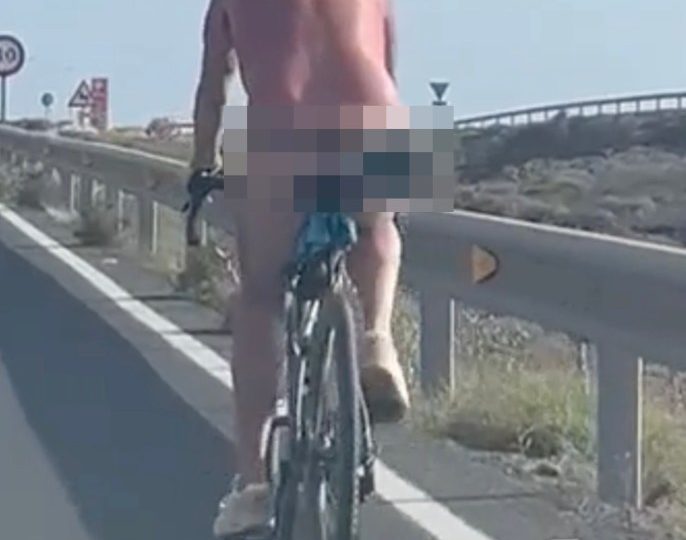LOCALS have been left raging after a tourist was spotted cycling around Lanzarote completely naked.
Residents of the island have now slammed the cyclist for his brazen act amid a wave of anti-tourism protests in Spain.
SolarpixThe tourist was seen wearing nothing but a pair of trainers and a hat[/caption]
The shameless act was filmed by a local driverSolarpix
Anti-tourist protesters have been taking to the streets across Spanish holiday hotspots
The middle-aged man was filmed pedalling completely naked on Saturday in the northeastern part of the holiday island.
Identified as a foreigner due to his appearance, he was seen wearing a pair of trainers and a hat while carrying a bum bag around his waist.
A woman filming the shocking scene from the car behind said: “I just can’t believe it.”
As the shocking pictures circulated online Spanish locals fumed, with some even suggesting he should be arrested.
Others called him “gross and disrespectful”.
Vanesa Figueroa, a hotel worker living in the Lanzarote capital Arrecife, said of the latest stunt: “That’s called nudism on the road. Children should not have to see things like this.”
One social media user said: “Why does all the s*** end up here? I’m sure that if he was in his own country he wouldn’t be doing this because he would know he wouldn’t get away with it.”
Another added: “Lanzarote is out of control and no-one is doing anything.”
The naked bike rider was filmed in action less than a month after a mystery tourist was spotted walking through the centre of the Majorcan capital Palma with just green Speedos on.
He strolled down a busy street surrounded by others, all fully dressed.
One woman, Lisa, wrote: “Please arrest these near naked people.
“Or the shirtless, near-nude, bikini-wearing morons who wander around markets, towns and shops. Ukkk! Quality tourism can’t come soon enough!”
It is in fact illegal to only wear a bikini or swimming shorts in some public parts of Spain – including the Balearic Islands.
Brits can be hit with a fine of up to £500 in the popular holiday destination for wearing swimwear or going shirtless anywhere but the beach.
However, tourists visiting the Balearic Islands are either unaware of the rules or don’t seem to care.
Just a few days ago, a group of nearly-naked tourists left locals stunned as they strolled around Majorca wearing very little.
The holidaymakers were filmed walking around Palma wearing only their bikinis after getting off one of the party boats in the area.
Footage showed a group of five women brazenly strolling along the promenade in their swimsuits.
They appear unfazed by the locals’ stares and casually cross the road wearing next to nothing.
New rules in the Balearic Islands
THE Spanish government has some strict rules in place for those visiting Majorca, Minorca and Ibiza.
Certain restaurants have dress codes, banning tops without straps, swimwear or football kits.
Holidaymakers can also be fined for walking around topless or in a state of undress while not on the beach.
You could even get into trouble for driving topless.
At some hotels, men might have to wear proper trousers for dinner.
Authorities in Majorca are cracking down on tourists by imposing fresh bans on drinking on the streets and graffiti.
Any tourist breaching the new rules could be slapped with a fine of £1,300.
The penalty can be increased up to £2,600, in case the grounds of the offence are more serious.
Fines for graffiti, vandalism and loud slogans have also been increased to £2,600.
If minors are found to commit graffiti vandalism, their parents will be held responsible – and will be forced to pay the fine.
Flooding the streets with banners, posters and advertising brochures is now prohibited.
Destroying listed buildings, monuments, and other important public areas would be considered a serious offence – and could attract fines of up to £2,600.
A wave of anti-tourism protests has erupted across multiple European holiday hotspots as locals call for an end to “low quality” tourism.
Residents complain of shameful acts by tourists such as display of nudity and frequent violent brawls after getting drunk.
Overcrowding has become the main problem in many sunny destinations, with authorities trying to find a solution to keep tourists and locals happy.
Locals say they are “fed-up” with Brits who only come for the cheap beer, burgers and sunbathing.
Just a few days ago, a drunk Brit tourist sparked chaos after blocking a busy road in Menorca – twice on the same day.
Dramatic footage caught the man taking a casual stroll in the middle of the street forcing busy traffic to stop.
The drunk Brit was seen lifting his arms in the air with his trainers in his hands as he walked along the tarmac in shorts and a shirt.
Harsh anti-tourist graffiti has appeared on walls in popular hotspots in Greece and Spain, urging holidaymakers to “go home”.
This man was seen walking in Majorca wearing only a pair of swimming trunks
A group of tourists was seen walking around in Palma wearing just bikinis
Shirtless young Brit tourists covered in foam while enjoying a holiday in Spain
Authorities across the major holiday hotspots in Spain are now imposing stricter laws to curb tourists from creating chaos.
To tackle boozy tourists, authorities have hit Majorca and Ibiza with a nightly booze ban after 9.30pm which is expected to be enforced immediately.
Meanwhile, the Committee of Tourism, Trade, Employment, Culture and Sport has reportedly approved an initiative to reintroduce a cap on cruise ships to Palma, Majorca’s capital.
Locals are also expressing their voices through large-scale demonstrations against the massive influx of tourists.
Demonstrators flocked to Majorcan beaches over the weekend in yet another display of locals’ discontent with holidaymakers and mass tourism.
Protesters are also preparing to hit the streets of Malaga in less than a month.
They have planned a march on June 29 with the slogan: “For decent housing and against the processes of touristification and precariousness of life.”
Frustrated locals in Malaga claim they are being priced out of their own neighbourhoods – and more properties are being converted into hotels and tourist rentals offering short stays to visiting foreigners.
Others said the city has become “unlivable”.
Post-pandemic, a large number of remote workers has been moving to Spain for a cheaper cost of living, The Local reports.
And expats are often earning higher wages than locals – leaving them struggling to compete.
Thousands took to the streets in Tenerife last month to demand restrictions on holidaymakers.
More than 15,000 people waved Canary Islands’ flags and blew horns to make a deafening noise in the capital Santa Cruz.
Messages in English left on walls and benches in and around the island read “My misery your paradise” and “Average salary in Canary Islands is 1,200 euros.”
But the Canary Islands president Fernando Clavijo expressed his concern over the growing anti-tourism movement and begged holidaymakers to keep coming.
Anti-tourist measures sweeping hotspots
A WAVE of anti-tourist measures are being implemented across Europe to curb mass tourism in popular holiday hotspots.
Officials have attempted to reduce the impact of holidaymakers by implementing additional taxes on tourists, or banning new hotels.
Earlier this year Venice became the first city in the world to charge an entry fee for holidaymakers after it started charging day-trippers €5 (£4.30) for visiting the historical city centre.
It was followed by an area in Barcelona which resorted to removing a well-used bus route from Apple and Google Maps to stop crowds of tourists from using the bus.
Meanwhile, San Sebastián in the north of Spain, limited the maximum number of people on guided visits to 25 to avoid congestion, noise, nuisance and overcrowding.
The city has already banned the construction of new hotels.
The Spanish government has allowed restaurants to charge customers more for sitting in the shade in Andalucia.
Benidorm has introduced time restrictions – swimming in the sea between midnight and 7am could cost a whopping £1,000.
The Canary Islands are also considering adopting measures to regulate the number of visitors and charge tourists a daily tax.
Greece has already enforced a tourist tax during the high season (from March to October) with visitors expected to pay from €1 (£0.86) to €4 (£3.45) per night, depending on the booked accommodation.
Officials in Santiago de Compostela in Galicia want to introduce a fee for travellers to remind people to be courteous during their trips.
As many as 10,000 people demanded limits on the number of visitors allowed in Majorca
One protester holds a placard which reads: ‘SOS residents’
Thousands of people demonstrate against tourism policies in Tenerife
Hostile messages against foreigners can be found on the walls
Leave a comment









